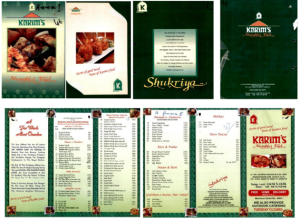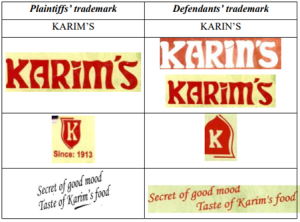 The plaintiffs, proprietors of the registered trademark “KARIM’S,” filed a suit contending that the defendants, by using a nearly identical mark “KARIN’S,” were infringing their trademark and passing off their goods as those of the plaintiffs. The defendants joined the proceedings but failed to file written statements while the plaintiffs presented their evidence. Once the trial concluded, the matter was presented before the Delhi High Court for final adjudication.
The plaintiffs, proprietors of the registered trademark “KARIM’S,” filed a suit contending that the defendants, by using a nearly identical mark “KARIN’S,” were infringing their trademark and passing off their goods as those of the plaintiffs. The defendants joined the proceedings but failed to file written statements while the plaintiffs presented their evidence. Once the trial concluded, the matter was presented before the Delhi High Court for final adjudication.
Plaintiff’s Contentions
Plaintiff No. 1 is the registered proprietor of the trademark “KARIM’S,” renowned for Mughlai cuisine since 1913. The trademark, initially adopted by Mr Haji Karimuddin, was passed down to his descendants. In 1987, his heirs established Karim Hotels Pvt. Ltd. to expand their business. Plaintiff No. 1 registered the trademark on December 24, 1998, in class 29 and has since secured multiple registrations for stylised variants of their trademarks. Plaintiff No. 1 also claimed copyright protection for the artistic works comprising these labels.
It was claimed that the continuous use of the “KARIM’S” trademark has built significant goodwill and reputation. Plaintiff No. 1 grants licenses for commercial use of the trademark, including to Plaintiff No. 2, Karim’s Mughlai Foods, owned by Mr. Asifuddin. Plaintiff No. 2 leased premises from Defendant No. 2, agreeing that Defendant No. 1 (son of Defendant No. 2) would receive 12% of the restaurant’s sales. The agreement also stipulated that the “KARIM’S” trademark and goodwill would remain with Plaintiff No. 2.
When the business did not meet expectations, Plaintiff No. 2 terminated the lease by paying a severance fee. A Cancellation Agreement on November 1, 2009, prevented Defendant No. 1 from using the “KARIM’S” trademark or any similar mark.
In November 2010, Plaintiffs discovered that Defendant No. 1 was using a similar mark, “KARIN’S,” along with Plaintiff’s trademarks, for a restaurant at the lease premises. This included copying signboards and menu cards and falsely claiming descent from Mr Haji Karimuddin.
Plaintiff No. 1 issued a cease-and-desist notice on November 22, 2010, temporarily stopping the activities. However, on April 23, 2012, the plaintiffs found that the defendants had resumed operations, leading to this suit.
Relevant Proceedings before the Court
On May 18, 2012, an ex-parte ad-interim injunction was granted, restraining the defendants from using Plaintiff No. 1’s trademark at the lease premises. A Local Commissioner was appointed to seize goods bearing the trademark. Both defendants were served with summons but did not file written statements, and therefore, their right to contest was closed on January 22, 2013.
Local Commissioner’s Report
The Local Commissioner executed the commission on May 26, 2012, at the lease premises. Upon arrival, it was observed that the restaurant was displaying the “KARiM’S” trademark on its glass door and signboards. Photographs of the premises and trademarked items were taken. Seized items included 21 menu cards, 3587 menu leaflets, and one cash bill, all sealed in a carton. Copies of the newspapers used to date the photographs were also included.
The photographs of the infringing goods seized from the Defendants’ premises, annexed with the Local Commissioner’s Report included:

Defendants’ Position
Although the Defendants filed no written statement, they submitted short affidavits stating their positions:
Defendant No. 1:
- Defendant No. 2 owns the premises at A-169, Adarsh Nagar, NH-24, Ghaziabad, UP. Defendant No. 1 ran a restaurant on an oral lease of Rs. 20,000 per month.
- A franchise agreement with the Plaintiff was later terminated, and Defendant No. 1 received Rs. 10 lakh for the premature termination. After this, Defendant No. 1 entered a different business.
- Defendant No. 1 invested Rs. 35 lakh into the restaurant but only received Rs. 10 lakh upon termination, resulting in significant financial loss.
- Defendant No. 1 claimed that Plaintiff frequently offers franchises and then terminates them, causing financial loss to the franchisees.
Defendant No. 2:
- The restaurant “KARINS” ceased operations in October 2012, and the premises were vacated.
- Defendant No. 2 is no longer running any business from A-169, Adarsh Nagar, Ghaziabad, UP.
- After closing the “KARINS” business, Defendant No. 2 asserted that no dispute remained between the parties.
Court Analysis and Findings
The Delhi High Court reviewed the submissions and records to determine the issue of trademark infringement. A visual comparison of the trademarks shows:

The Court observed that the trademarks were indistinguishable, with the Defendants replicating all aspects of the plaintiffs’ trademarks, including font, design, colour scheme, style, and taglines, used for identical services. This deliberate imitation suggested an attempt to deceive consumers into thinking the defendants’ business was still associated with the Plaintiffs. The similarities constituted a clear infringement under Sections 29(1) and 29(2)(b) and (c) of the Trademarks Act, 1999, and also violated the plaintiffs’ copyright.
The defendants had not provided a defence, while the plaintiffs had established ownership of the “KARIM’S” trademarks with registration certificates. The defendants had acknowledged this ownership in affidavits and agreements, agreeing not to use the “KARIM’S” trademarks. However, they continued using the trademarks, as evidenced by the Local Commissioner’s Report.
Defendant No. 1 claimed a franchise agreement terminated with a payment of Rs. 10,00,000, but this claim lacked evidence and was not presented in a written statement. No Franchise Agreement was produced, whereas the Plaintiffs proved the Lease and Cancellation Agreements, showing the Defendants used the marks without authorisation after the lease termination. Therefore, the Court found that the plaintiffs had clearly established trademark and copyright infringement by the defendants.
Relief Granted
Since Defendant No. 2, the owner of the lease premises affirmed that the Defendants no longer use the disputed marks, the plaintiffs waived their claims for damages, rendition of accounts, and delivery up but requested costs to cover litigation expenses.
The Court decreed the suit in favour of the plaintiffs. Regarding costs, Defendant No. 2 argued that Defendant No. 1 conducted the infringing activities despite familial discord. Therefore, the plaintiffs were entitled to recover the actual costs from Defendant No. 1.
Conclusion
This ruling emphasises the importance of protecting intellectual property rights, particularly trademarks. The Court’s decision favouring “KARIM’S” highlights the legal protections against unauthorised use and imitation. The Court reaffirms that trademark infringement will not be tolerated by ruling against the Defendants and awarding costs to the plaintiffs. This case underscores the need for vigilance in safeguarding brand identity and serves as a crucial precedent for businesses to protect their intellectual property.
Authors: Manisha Singh and Kratika Patel
First Published by: Lexology here



